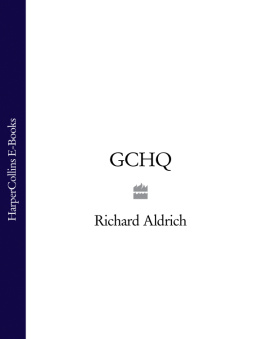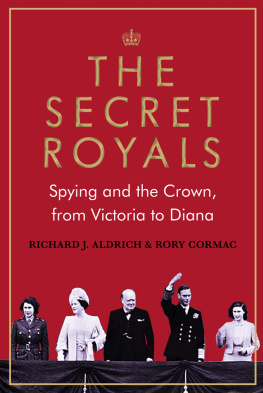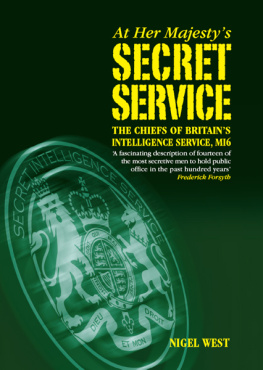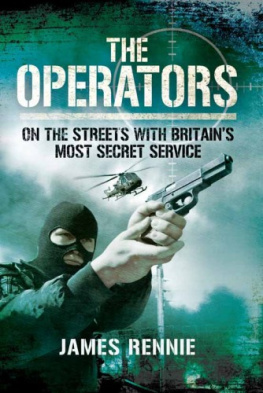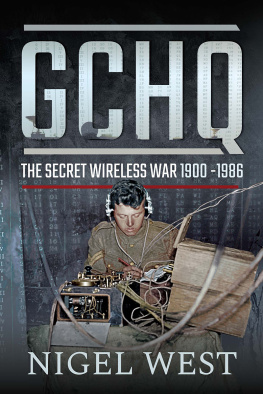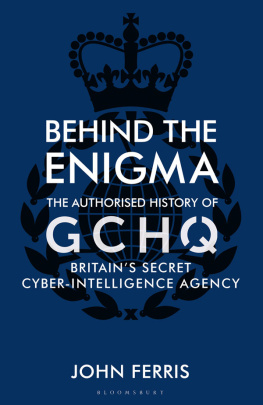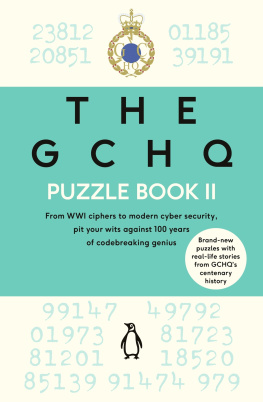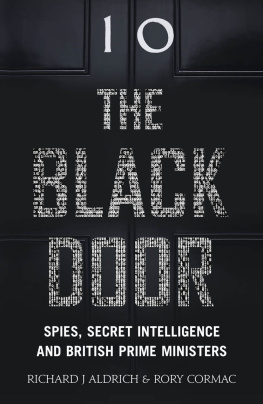Richard James Aldrich - GCHQ: the uncensored story of Britains most secret intelligence agency
Here you can read online Richard James Aldrich - GCHQ: the uncensored story of Britains most secret intelligence agency full text of the book (entire story) in english for free. Download pdf and epub, get meaning, cover and reviews about this ebook. year: 2010, publisher: Harper Press, genre: History. Description of the work, (preface) as well as reviews are available. Best literature library LitArk.com created for fans of good reading and offers a wide selection of genres:
Romance novel
Science fiction
Adventure
Detective
Science
History
Home and family
Prose
Art
Politics
Computer
Non-fiction
Religion
Business
Children
Humor
Choose a favorite category and find really read worthwhile books. Enjoy immersion in the world of imagination, feel the emotions of the characters or learn something new for yourself, make an fascinating discovery.
- Book:GCHQ: the uncensored story of Britains most secret intelligence agency
- Author:
- Publisher:Harper Press
- Genre:
- Year:2010
- Rating:4 / 5
- Favourites:Add to favourites
- Your mark:
- 80
- 1
- 2
- 3
- 4
- 5
GCHQ: the uncensored story of Britains most secret intelligence agency: summary, description and annotation
We offer to read an annotation, description, summary or preface (depends on what the author of the book "GCHQ: the uncensored story of Britains most secret intelligence agency" wrote himself). If you haven't found the necessary information about the book — write in the comments, we will try to find it.
GCHQ: the uncensored story of Britains most secret intelligence agency — read online for free the complete book (whole text) full work
Below is the text of the book, divided by pages. System saving the place of the last page read, allows you to conveniently read the book "GCHQ: the uncensored story of Britains most secret intelligence agency" online for free, without having to search again every time where you left off. Put a bookmark, and you can go to the page where you finished reading at any time.
Font size:
Interval:
Bookmark:
For Libby (for the dark night-time)
- Adastral Park, Martlesham Heath, Suffolk, BT Research Laboratories, 1975
- Beaumanor/Garats Hay, Leic., postwar Army sigint base & Special Projects Agency, 194594
- Bletchley Park; this remained a sigint training site after the war until 1985
- Boddington, Glos, (RAF) military communications unit working with GCHQ
- Bower, Bowermadden near Wick, listening station, closed 1975
- Brawdy, Haverfordwest, Wales, 14 Signals Regiment (electronic warfare)
- Brora, Sutherland, listening station, closed 1984
- Capenhurst Tower, Cheshire, intercepting telephone traffic to Ireland, 199098
- Cheadle, Staffs, (RAF) listening station, closed 1996
- Cheltenham (Oakley and Benhall); GCHQ moved to the twin sites between 1952 and 1954
- Chicksands, Beds, NSA/USAF until 1994, then UK Defence Intelligence & Security Centre
- Cricklade, Wilts, GCHQ experimental radio station
- Culmhead, Somerset, GCHQ Central Training School, replacing Bletchley, 198594
- Digby, Lincs, main centre for RAF ground sigint and now UK joint services sigint centre
- Edzell, Brechin, US Navy/NSA site, 196096
- HMS Flowerdown, near Winchester, listening station, closed 1977
- Gilnahirk, Belfast, listening station, closed 1978
- Hanslope Park, near Milton Keynes, Diplomatic Wireless Service and DTMS
- Hawklaw, (Cupar) Fife, listening station, closed 1988
- Hereford, 264 Signal Squadron supporting 22 SAS
- Irton Moor, Scarborough, listening station, now GCHQ Scarborough
- Island Hill, Comber, Northern Ireland, closed 1977
- Ivy Farm, Knockholt Pound, Kent, listening station
- Kirknewton, near Edinburgh, US listening station, closed 1966
- Menwith Hill, near Harrogate, US Army listening station, taken over by NSA 1963
- HMS Mercury, near Petersfield, naval signals centre, 194193
- Morwenstow, now GCHQ Bude, focused on satellite communications, 1969
- Oakhanger, (RAF) control centre for Skynet since 1967
- Royal Radar Establishment, Malvern, from 1953, later Defence Research Agency
- Waddington, Lincs, (RAF) Nimrod R1s of 51 Squadron since 1995
- Watton, Norfolk, (RAF) Central Signals Establishment, 192 Squadron 194563
- Whaddon Manor, Bucks, outstation of Bletchley Park, closed 1946
- Wyton, Cambridgeshire, (RAF) Comets and Nimrod R1s of 51 Squadron, 196395
- London
Chester Road, Borehamwood, (GCHQ/SIS) factory making radio microphones in the 1950s
Chesterfield Street W1, London office for GCHQ in the late 1940s
Dollis Hill, North London, Post Office Research Station, 192175
Eastcote, Harrow; GCHQ moved here in 1946 and some comsec staff remained after 1952
Empress State Building, Earls Court, listening station, 196294
London Processing Group, St Dunstans Hill, City of London, moved to Cheltenham 1975
Northwood Hills, small postwar GCHQ site; Permanent Joint HQ since 1996
Palmer St W1, LCSA headquarters until 1969; also GCHQs London office
On 1 November 1919, Britain created the Government Code and Cypher School, or GC&CS, the nations first integrated code-making and code-breaking unit. The term GC&CS remained in widespread use until the end of the Second World War.
By contrast, Government Communications Headquarters, or GCHQ, is a term of uncertain origin. Originally developed as a cover name for Bletchley Park in late 1939, it competed for usage with several other designations, including BP, Station X and indeed GC&CS. However, the Government Code and Cypher School remained the formal title of the whole organisation in wartime. During 1946, GC&CS re-designated itself the London Signals Intelligence Centre when the staff of Bletchley Park decamped to a new site at Eastcote near Uxbridge, although GCHQ remained in widespread use as a cover name. On 1 November 1948, as Britains code-breakers began to investigate a further move away from London to Cheltenham, the term GCHQ was formally adopted and has remained in use ever since.
Code-breaker is also a troublesome phrase. Codes are usually considered to be words substituted for others, often chosen somewhat at random. Typically, the military operations that constituted D-Day in 1944 were code-named Overlord. By contrast, systems of communication where letters and numbers are substituted in an organised pattern, either by machine or by hand, are referred to as cyphers. Yet the term code-breaker is so frequently applied to the people who worked at Bletchley Park and at GCHQ that this book follows common usage.
The constantly changing names of the Soviet intelligence and security services are especially vexing and so, despite the inescapable anachronisms, the Soviet civilian intelligence service is referred to as KGB until 1989, while the military intelligence service is denoted as GRU. In Britain, the Security Service is denoted here by the commonly known term MI5 and its sister organisation, the Secret Intelligence Service or MI6, is referred to as SIS. Ships and submarines names are italicised, e.g. HMS Turpin. Onshore naval bases and training establishments, e.g. HMS Anderson, are not italicised.
A-2US Air Force Intelligence
ASAArmy Security Agency [American]
ASIOAustralian Security Intelligence Organisation
BDSBritish Defence Staff, Washington
BfVWest German security service
BJBlue jacket file for signals intelligence or an individual intercept
Blue BookWeekly digest of comint material for the PM
BNDBundesnachrichtendienst foreign intelligence service of West Germany
BrixmisBritish Military Mission to the HQ Soviet Army in East Germany
BRUSAAngloAmerican signals intelligence agreement, 1943
CChief of the British Secret Intelligence Service (SIS)
CESDCommunications-Electronics Security Department, succeeded by CESG
CESGCommunications-Electronics Security Group
CIACentral Intelligence Agency [American]
comintCommunications intelligence
comsecCommunications security
CSECommunications Security Establishment [Canadian]
CSUCivil Service Union
CXPrefix for a report originating with SIS
DISDefence Intelligence Staff
DMSIDirector of Management and Support for Intelligence in DIS
DSDDefence Signals Department [Australian], formerly DSB
DWSDiplomatic Wireless Service
elintElectronic intelligence
FBIFederal Bureau of Investigation [American]
GC&CSGovernment Code and Cypher School
GCHQGovernment Communications Headquarters
GRUSoviet Military Intelligence
GTACGovernment Technical Assistance Centre, established in 2000 later NTAC
IRSIGInstructions and Regulations concerning the Security of Signals Intelligence [Allied]
JICJoint Intelligence Committee
JSRUJoint Speech Research Unit
JSSUJoint Services Signals Unit, combined sigint collection units
KGBRussian secret service
LCSALondon Communications Security Agency, until 1963
LCSALondon Communications-Electronics Security Agency, until 1965
LPGLondon Processing Group
MI5Security Service
MI6Secret Intelligence Service (also SIS)
MiGMikoyan Soviet fighter aircraft
MoDMinistry of Defence
MTIMethods to Improve, sequential five-year sigint programmes at GCHQ
NATONorth Atlantic Treaty Organisation
NSANational Security Agency [American]
NTACNational Technical Assistance Centre, previously GTAC
PHPPost-Hostilities Planning Committee
PSISPermanent Secretaries Committee on the Intelligence Services
SASSpecial Air Service
SBSSpecial Boat Service
SDECEFrench intelligence service
Font size:
Interval:
Bookmark:
Similar books «GCHQ: the uncensored story of Britains most secret intelligence agency»
Look at similar books to GCHQ: the uncensored story of Britains most secret intelligence agency. We have selected literature similar in name and meaning in the hope of providing readers with more options to find new, interesting, not yet read works.
Discussion, reviews of the book GCHQ: the uncensored story of Britains most secret intelligence agency and just readers' own opinions. Leave your comments, write what you think about the work, its meaning or the main characters. Specify what exactly you liked and what you didn't like, and why you think so.

